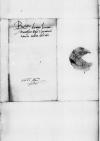Ea, quae Mauritius (Moritz), at least in 1537-1547 servant of Ioannes Dantiscus, often sent with letters and packages to the royal court (CIDTC, e.g. IDL 1630, IDL 4476, IDL 3266, IDL 3279)⌊MauriciusMauritius (Moritz), at least in 1537-1547 servant of Ioannes Dantiscus, often sent with letters and packages to the royal court (CIDTC, e.g. IDL 1630, IDL 4476, IDL 3266, IDL 3279)⌋, servitor Vestrae Paternitatis, et de telae superinscribed⌈telaetelae superinscribed⌉ pretio, et de
cubitorum numero nobis a Vestra Paternitate per illum missae nobis dixerat, in bonam partem accepimus omnia. Nec de hoc Vestram Paternitatem sollicitam esse oportuit. Dixit Mauritius (Moritz), at least in 1537-1547 servant of Ioannes Dantiscus, often sent with letters and packages to the royal court (CIDTC, e.g. IDL 1630, IDL 4476, IDL 3266, IDL 3279)⌊illeMauritius (Moritz), at least in 1537-1547 servant of Ioannes Dantiscus, often sent with letters and packages to the royal court (CIDTC, e.g. IDL 1630, IDL 4476, IDL 3266, IDL 3279)⌋ id, non quod scivit, sed quod ab alio audivit. Simplicitas est favore digna. Cautior Mauritius (Moritz), at least in 1537-1547 servant of Ioannes Dantiscus, often sent with letters and packages to the royal court (CIDTC, e.g. IDL 1630, IDL 4476, IDL 3266, IDL 3279)⌊isMauritius (Moritz), at least in 1537-1547 servant of Ioannes Dantiscus, often sent with letters and packages to the royal court (CIDTC, e.g. IDL 1630, IDL 4476, IDL 3266, IDL 3279)⌋ postea in verbis erit. Vestra Paternitas gratia sua prosequi illum velit. Pro tela autem ipsa nobis missa Vestrae Paternitati iterum atque iterum gratias habemus. Mappas, cum afferentur, ut Vestra Paternitas mitti ad nos cito curet, oramus.
De Georg Schewecke (Georg Scheffke) (*1491 – †1547), 1522 Gdańsk alderman; 1525 - town councillor; 1528 - judge; 1531 - mayor; 1536-1537, 1540, 1542-1545 - burgrave; 1534 Gdańsk envoy to convention in Lüneburg in affairs of seafaring and conflicts with Lübeck (AT 15, p. 501, 510; AT 16/1, p. 42, 44; ZDRENKA 2, p. 275)⌊Georgio SchewkeGeorg Schewecke (Georg Scheffke) (*1491 – †1547), 1522 Gdańsk alderman; 1525 - town councillor; 1528 - judge; 1531 - mayor; 1536-1537, 1540, 1542-1545 - burgrave; 1534 Gdańsk envoy to convention in Lüneburg in affairs of seafaring and conflicts with Lübeck (AT 15, p. 501, 510; AT 16/1, p. 42, 44; ZDRENKA 2, p. 275)⌋ curae nobis erit. Nec de Sigismund I Jagiellon (Zygmunt I) (*1467 – †1548), King of Poland and Grand Duke of Lithuania (1506-1548); Duke of Głogów (Glogau) (1499-1506), Duke of Opava (1501-1506), Governor of Silesia (1504-1506); son of King Kazimierz IV Jagiellon and Elisabeth of Austria⌊maiestate regiaSigismund I Jagiellon (Zygmunt I) (*1467 – †1548), King of Poland and Grand Duke of Lithuania (1506-1548); Duke of Głogów (Glogau) (1499-1506), Duke of Opava (1501-1506), Governor of Silesia (1504-1506); son of King Kazimierz IV Jagiellon and Elisabeth of Austria⌋ dubitamus, quin et Georg Schewecke (Georg Scheffke) (*1491 – †1547), 1522 Gdańsk alderman; 1525 - town councillor; 1528 - judge; 1531 - mayor; 1536-1537, 1540, 1542-1545 - burgrave; 1534 Gdańsk envoy to convention in Lüneburg in affairs of seafaring and conflicts with Lübeck (AT 15, p. 501, 510; AT 16/1, p. 42, 44; ZDRENKA 2, p. 275)⌊huius viri boniGeorg Schewecke (Georg Scheffke) (*1491 – †1547), 1522 Gdańsk alderman; 1525 - town councillor; 1528 - judge; 1531 - mayor; 1536-1537, 1540, 1542-1545 - burgrave; 1534 Gdańsk envoy to convention in Lüneburg in affairs of seafaring and conflicts with Lübeck (AT 15, p. 501, 510; AT 16/1, p. 42, 44; ZDRENKA 2, p. 275)⌋, et commendationis Vestrae Paternitatis dignam rationem sit habitura. Et nos rem omnibus conatibus promovere volumus.
De domino Samuel Maciejowski (*1499 – †1550), humanist and diplomat, one of the most trusted advisors to King Sigismund I and then to his son Sigismund II Augustus; from 1521 Canon of the Collegiate Chapter in Sandomierz, and from 1530 in Kielce; from 1531 Canon of Gniezno; from 1532 or 1533 to 1537 royal secretary (previously scribe at the royal chancellery); 1537-1539 Grand Secretary; 1539-1547 Crown Vice-Chancellor; 1539-1541 Bishop of Chełm; 1541-1545 Bishop of Płock; 1545-1550 Bishop of Cracow; 1547-1550 Crown Grand Chancellor; in 1532 royal envoy to Rome; in 1534 and 1538 royal envoy to the local diets (WYCZAŃSKI 1990, p. 257-258; Urzędnicy 10, p. 184; PSB 19 Machowski - Maria Kazimiera, p. 64-69)⌊episcopo PlocensiSamuel Maciejowski (*1499 – †1550), humanist and diplomat, one of the most trusted advisors to King Sigismund I and then to his son Sigismund II Augustus; from 1521 Canon of the Collegiate Chapter in Sandomierz, and from 1530 in Kielce; from 1531 Canon of Gniezno; from 1532 or 1533 to 1537 royal secretary (previously scribe at the royal chancellery); 1537-1539 Grand Secretary; 1539-1547 Crown Vice-Chancellor; 1539-1541 Bishop of Chełm; 1541-1545 Bishop of Płock; 1545-1550 Bishop of Cracow; 1547-1550 Crown Grand Chancellor; in 1532 royal envoy to Rome; in 1534 and 1538 royal envoy to the local diets (WYCZAŃSKI 1990, p. 257-258; Urzędnicy 10, p. 184; PSB 19 Machowski - Maria Kazimiera, p. 64-69)⌋, ut istuc negotii
Gdanen(sis) or Gdanen(sium)⌈Gdanen(sis)Gdanen(sis) or Gdanen(sium)⌉ componendi gratia proficiscatur, Sigismund I Jagiellon (Zygmunt I) (*1467 – †1548), King of Poland and Grand Duke of Lithuania (1506-1548); Duke of Głogów (Glogau) (1499-1506), Duke of Opava (1501-1506), Governor of Silesia (1504-1506); son of King Kazimierz IV Jagiellon and Elisabeth of Austria⌊regia maiestasSigismund I Jagiellon (Zygmunt I) (*1467 – †1548), King of Poland and Grand Duke of Lithuania (1506-1548); Duke of Głogów (Glogau) (1499-1506), Duke of Opava (1501-1506), Governor of Silesia (1504-1506); son of King Kazimierz IV Jagiellon and Elisabeth of Austria⌋ et nos facile assensi sumus.
Vestra Paternitas bene et feliciter valeat, nostri sit memor in orationibus suis.


 BCz, 3465, p. 300
BCz, 3465, p. 300